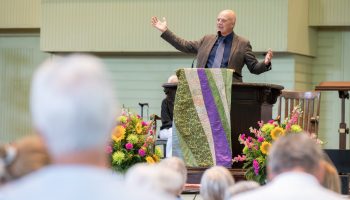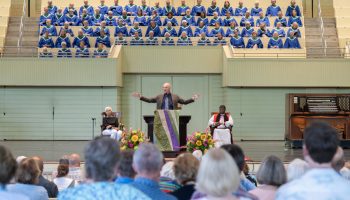
“After struggle, after the silence of God’s absence, we have come full circle to praise, joy and gratitude,” the Rev. Frank M. Yamada said to the congregation at the 9:15 a.m. Friday morning worship service in the Amphitheater. “We have taken a journey through the psalms this week. We have felt the rhythms of life when it is out of step, but we return to God’s time signature.”
He continued, “We have moved from lament, pleading for justice, laying our rawness before God, and faithfulness has been returned by God. We have resolution into joyful praise.” Yamada’s sermon title was “The Mercy of the Lord Endures Forever — Returning to Gratitude,” and the scripture text was Psalm 100.
Psalm 100, verses 1-3 are an exhortation: “Make a joyful noise to the Lord, all the earth. / Serve the Lord with gladness; / come into his presence with singing. / Know that the Lord is God. / It is he who made us, and we are his; / we are his people and the sheep of his pasture.”
This psalm is a doxology that tells us who God is and who we are before God, he said. We give thanks because God’s mercy endures forever, and God’s hesed, God’s faithfulness, endures forever.
Verse 4, “Enter his gates with thanksgiving / and his courts with praise. / Give thanks to him; bless his name,” is an exhortation to enter into God’s presence and give praise. The reason to give praise is found in verse 5, “For the Lord is good; / his steadfast love endures forever / and his faithfulness to all generations.”
Yamada said, “The reason we give praise is that we know the Lord is God and we are God’s people, the sheep of his pasture. His steadfast love and faithfulness extend to all generations.”
He continued, “Our gratitude comes from a deep awareness that in life and death we are God’s. We are God’s, so we can weather the storms of life. God is a very present help. The Lord is our shepherd, and we are God’s sheep. Gratitude begins in the unshakeable truth that God made us and loves us. We are singing to the one who never left us.”
Yamada told the congregation that to say verse 5, the last movement of the psalm, is an act of faithful resistance when the world is falling apart.
Against the raging conflicts, we can praise with joy.
“The Lord is good even when life is not. God’s hesed goes from generation to generation. Even when we can’t see the road ahead, we return with justice and peace to our Lord,” he told the congregation.
As an example, Yamada described being on a long trip, waiting in line, sleeping in strange beds and eating food meant to feed the masses.
“When we open the door to our home, we exhale, we sit at our own table, eat our own food, which tastes good, and sleep in our own bed. God’s peace is not about being perfect but being at home, at rest and safe.”
The psalmist invites the congregation home, not to a place, but to a person, to God, who always loves. When we return to joy and worship, we have come home.
“Peace is hard to find, while anxiety is all around us. In a world where people are afraid, they are easy to control. We wonder if there will be anything left. Then comes the ancient call to worship in verses 1–3. We make a connection to a deeper reality, and we know that God’s hesed will not falter — it continues to burn bright,” Yamada said.
Let us return because there is peace, because God is still good, he said. “Praise is faithful resistance and gratitude in the natural response to the peace and justice that will come.”
In summarizing his series of sermons, Yamada said that the psalms have led from laments, to waiting, to praise.
“Let us be people who live in God’s time and still give thanks.” He quoted from Charles Wesley’s hymn, “Love Divine, All Loves Excelling,” saying, “Changed from glory into glory / Till in Heav’n we take our place, Till we cast our crowns before thee, / Lost in wonder, love, and praise!”
The Rev. Rachel Erin Stuart, senior pastor of Hurlbut Memorial Community United Methodist Church, presided. The Rev. Roger Rice, a retired Presbyterian minister from Ellicott City, Maryland, read the scripture. For the prelude, Joshua Stafford, director of sacred music and the Jared Jacobsen Chair for the Organist, performed “Nun danket alle Gott,” by Sigfrid Karg-Elert, on the Massey Memorial Organ. The Motet Choir sang “Jubilate Deo in C” for the anthem, with music by Benjamin Britten and text from Psalm 100. Stafford conducted and Owen Reyda, organ scholar, accompanied the choir on the Massey organ. Stafford performed “Toccata,” from Symphony No. 5 by Charles-Marie Widor, for the postlude. Support for this week’s chaplaincy and services were provided by the Jackson-Carnahan Memorial Chaplaincy, the J. Everett Hall Memorial Chaplaincy and the Randell-Hall Memorial Chaplaincy.




